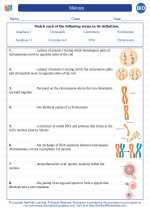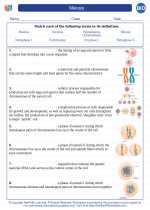Cellular Differentiation
Cellular differentiation is the process by which a less specialized cell becomes a more specialized cell type, both in structure and function. This process is essential for the development and maintenance of multicellular organisms.
Process of Cellular Differentiation
During development, cells undergo differentiation as they take on specific functions in the body. This process involves changes in gene expression, leading to the production of specific proteins and the development of distinct cell structures. Cellular differentiation enables cells to perform specific tasks, such as muscle contraction, hormone secretion, or nerve impulse transmission.
Key Concepts
- Gene Expression: The process by which information from a gene is used in the synthesis of a functional gene product, such as a protein.
- Stem Cells: Undifferentiated cells with the potential to develop into various cell types in the body.
- Cell Fate: The specific type of cell that a stem cell will become through the process of differentiation.
- Signaling Pathways: Molecular mechanisms that regulate the differentiation process through interactions between cells and their environment.
Factors Influencing Cellular Differentiation
Cellular differentiation is influenced by various factors, including:
- Cell-Cell Interactions: Communication between neighboring cells that can influence the fate of a cell.
- Extracellular Signals: Molecules in the cellular environment that can trigger specific differentiation pathways.
- Transcription Factors: Proteins that regulate gene expression and play a crucial role in determining cell fate.
- Epigenetic Modifications: Changes in gene expression that are not caused by alterations in the DNA sequence.
Applications and Importance
Understanding cellular differentiation is essential in various fields, including regenerative medicine, developmental biology, and cancer research. It provides insights into the mechanisms underlying the formation of different cell types and tissues, as well as potential therapeutic strategies for treating degenerative diseases and injuries.
Study Guide
To study cellular differentiation effectively, consider the following key points:
- Define cellular differentiation and its significance in the development of organisms.
- Explain the process of gene expression and its role in cellular differentiation.
- Discuss the concept of stem cells and their potential in regenerative medicine.
- Explore the factors that influence cellular differentiation, including cell-cell interactions, extracellular signals, and transcription factors.
- Consider the applications and importance of understanding cellular differentiation in various scientific and medical contexts.
Understanding cellular differentiation is crucial for comprehending the complex processes that shape the development and function of living organisms. By mastering this topic, you will gain valuable insights into the fundamental principles of biology and their implications for human health and disease.
.◂Biology Worksheets and Study Guides High School. Meiosis

 Worksheet/Answer key
Worksheet/Answer key
 Worksheet/Answer key
Worksheet/Answer key
 Vocabulary/Answer key
Vocabulary/Answer key
 Vocabulary/Answer key
Vocabulary/Answer key
 Vocabulary/Answer key
Vocabulary/Answer key
